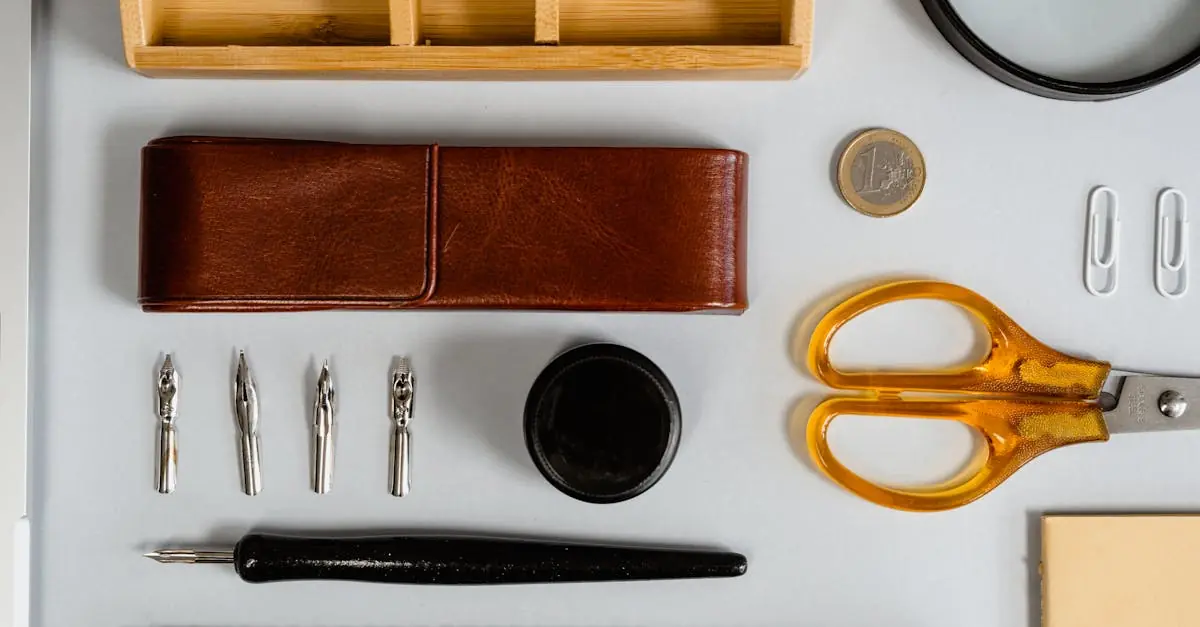Table of Contents
ToggleIn a world where calculators reign supreme, it’s time to unleash the power of your mind and tackle math like a pro—no gadgets required. Whether you’re trying to impress your friends at trivia night or just want to avoid the awkward silence when someone asks for a tip calculation, mastering no-calculator techniques can be a game changer.
Imagine breezing through everyday calculations with the confidence of a math wizard. From quick mental math tricks to clever estimation strategies, these tips will have you calculating faster than you can say “Pythagorean theorem.” So grab a cup of coffee, sit back, and prepare to unlock your inner math genius—because who needs a calculator when you’ve got a brain?
Overview of No-Calculator Needed Tips
Mastering mental math techniques significantly enhances everyday calculation skills. Quick tips make calculations more efficient without the need for technology. Simple tricks can help transform complex problems into manageable tasks. Estimation strategies prove beneficial in various scenarios, allowing for faster decision-making.
Utilizing benchmarks can simplify calculations. For example, rounding numbers to the nearest ten or hundred makes it easier to compute sums and differences. Moreover, recognizing patterns in numbers can facilitate quicker problem-solving.
Visualizing numbers often aids memory retention. Some find it helpful to create mental images of calculations, enhancing recall during daily activities. Practicing tricks repeatedly builds confidence in one’s ability to perform calculations in real time.
Engaging in regular practice sessions boosts overall math ability. Allocating a few minutes daily to solve math problems without tools sharpens skills. Testing oneself through games and challenges can also reinforce learning.
Many benefits accompany these techniques, including reduced anxiety during math-related tasks. Skillful mental calculations can impress peers and enhance one’s standing in academic or professional settings. Emphasizing practice and determination leads to continued improvement in mathematical prowess.
Quick Mental Math Techniques
Mastering quick mental math techniques enhances confidence when tackling everyday calculations. Simplifying complex problems transforms calculations into manageable tasks.
Estimation Strategies
Rounding numbers is a powerful estimation strategy. For instance, rounding 48 to 50 streamlines addition. When subtracting, 97 can become 100, which simplifies the process. Utilizing averages also aids in estimation; for example, when finding the average of 48 and 52, thinking of 50 helps. Visualizing numbers as clusters enhances mental capability. Grouping digits into sections eases larger calculations. Overall, applying estimation strategies not only speeds up calculations but also bolsters mental acuity.
Common Multiplication Shortcuts
Multiplying by 5 is straightforward. Simply take half of a number and add a zero, making 24 times 5 equal 120. Doubling and halving numbers also simplifies multiplication. For example, 16 times 25 becomes 8 times 50, yielding 400. Recognizing patterns can aid memorization; for instance, knowing that any number multiplied by 10 or 100 adds zeros reinforces confidence. Utilizing these shortcuts enhances speed and accuracy, essential for tackling math challenges efficiently. Adopting these multiplication techniques builds a strong foundation in mental math.
Practical Applications
Mastering no-calculator techniques proves useful in a variety of everyday contexts and academic situations. These skills enhance competence and foster confidence with numbers.
Everyday Scenarios
Daily life offers numerous opportunities for applying mental math techniques. Grocery shopping can become a breeze with quick estimations on totals. Rounding prices and calculating discounts allows for efficient budget management. Planning meals requires adjustments in serving sizes, which can swiftly transform through simple multiplication and division. He or she can easily calculate travel times by estimating speeds and distances. Engaging in these practices strengthens mental agility and reinforces the value of math skills in practical situations.
Academic Settings
Students benefit immensely from no-calculator strategies in classrooms and during examinations. Mental calculations often appear in standardized tests, where time management plays a crucial role. Quickly estimating answers can lead to better decision-making about which questions to tackle first. In mathematics classes, understanding foundational concepts relies on applying basic arithmetic without gadgets. Memorizing multiplication tables enhances speed and accuracy in solving equations. Students can improve performances by integrating these techniques into their study routines, making math less daunting and more approachable.
Benefits of Using No-Calculator Needed Tips
Improved confidence in calculations stems from practicing no-calculator techniques. Mastering mental math eliminates reliance on devices, allowing for quicker problem-solving in daily situations. Enhanced cognitive skills develop as individuals engage with numbers actively rather than passively.
Strengthened memory retention occurs when people visualize numbers and utilize estimation strategies. Success in budgeting during grocery shopping becomes easier with the ability to perform mental calculations quickly. Everyday tasks, like meal planning or splitting bills, also benefit from effective mental math skills.
Simplifying complex problems through tricks leads to more manageable calculations. Recognizing patterns becomes second nature, which accelerates memorization of multiplication tables or division strategies. Increased efficiency emerges in academic settings where time is often limited, allowing students to focus on understanding concepts instead of navigating calculations.
Daily practice and testing via games fuel ongoing improvement, reducing math-related anxiety over time. Academic performance improves as students practice mental math techniques during classroom activities and tests, where confidence translates directly to results.
Opportunities to integrate these skills into real-life scenarios underscore their practicality. Individuals become adept at making quick estimations and decisions based on their calculations, helping them manage budgets effectively and navigate social situations confidently.
Mastering no-calculator techniques can significantly enhance one’s confidence and efficiency in everyday calculations. By adopting mental math strategies and practicing regularly, individuals can simplify complex problems and improve their overall mathematical skills. These techniques not only foster independence from devices but also empower people to tackle real-life scenarios with ease.
Engaging in daily practice and incorporating fun challenges can reinforce learning and reduce anxiety associated with math tasks. As individuals become more comfortable with numbers, they’ll find themselves making quicker decisions and managing budgets more effectively. Embracing these skills opens up a world of possibilities, making math not just manageable but enjoyable.





